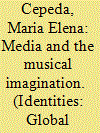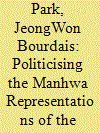| Srl | Item |
| 1 |
ID:
091783


|
|
|
|
|
| Publication |
2009.
|
| Summary/Abstract |
In May 2006, United States residents were witness to the largest pro-immigrant cross-country protests in the nation's history. During the apex of the pro-immigrant demonstrations, the single "Nuestro Himno," a Spanish-language paraphrasing of "The Star-Spangled Banner," was released. Both the "Nuestro Himno" recording and the demonstrations constituted important symbolic gestures toward the (re)claiming of U.S. public space and the contested meanings of citizenship, nation, and belonging. This essay commences with an overview of recent debates on cultural citizenship, followed by a discussion of the "musical imagiNation" as it pertains to Latino popular music in general. I juxtapose this commentary against a critical discourse analysis of mainstream (English-language) Internet and print media discourse regarding the "Nuestro Himno" recording and an audiovisual analysis of the hit video "Reggaeton Latino (Chosen Few Remix)" (2005). Employing "Nuestro Himno" as a analytical lens, I propose a (re)evaluation of the differential notions of (cultural) citizenship and family foregrounded in official and popular discourses: How does the discourse of family and nation that emerges from the media coverage of "Nuestro Himno" reflect prevailing beliefs about citizenship, belonging, and language? And if the marches of the spring of 2006 embody the political and social possibilities of cultural citizenship, then how are we to understand the contradictory underlying discourse of one of reggaeton most popular music videos, despite its seemingly inclusive promotion of the pan-Latino familia?
|
|
|
|
|
|
|
|
|
|
|
|
|
|
|
|
| 2 |
ID:
106877


|
|
|
|
|
| Publication |
2011.
|
| Summary/Abstract |
Conventional historiography presumes a linear development from urbanisation, the rise of indigenous middle classes and the spread of modernity towards nationalism as the logical outcome of this process. This article aims to disconnect modernity from nationalism by focusing on the role of cultural citizens in the late colonial period for whom modernity was a desirable lifestyle. The extent to which their desires and the interests of the colonial regime coincided is illustrated by a variety of advertisements and school posters, which invited members of the indigenous urban middle class to become cultural citizens of the colony.
|
|
|
|
|
|
|
|
|
|
|
|
|
|
|
|
| 3 |
ID:
167167


|
|
|
|
|
| Summary/Abstract |
This article discusses the nexus between comics, collective historical memory and politics in the context of the contemporary relationship between Japan and South Korea by examining the graphic manhwa narratives dealing with the memories of comfort women that were exhibited during the Angoulême Comics Festival in France in early 2014. With a theme of ‘memories of war and gendered violence’, commemorating the centennial of the outbreak of the First World War, the event that accommodated a special exhibition for Korean manhwa attracted controversy because of its political nature, drawing heavy media attention and sparking public debate and diplomatic quarrels. Adding academic depth to this cultural and diplomatic clash by linking the concepts of soft power foreign policy and cultural citizenship, this paper investigates what made the cultural event politically tainted and how the politicisation debate between the two countries escalated throughout the event. Existing studies on soft power foreign policy often leave the core contents of the ‘soft’ part unexplained. This article, in contrast, explores the current limits of accommodating cultural expressions of historical memories through an in-depth analysis of the exhibited artworks and the two countries’ nationalised soft power diplomacy. It argues that both governments’ direct and indirect intervention in the cultural realm nurtured irreconcilable cultural representations in this particular theme and genre of cultural representation under the current research.
|
|
|
|
|
|
|
|
|
|
|
|
|
|
|
|
| 4 |
ID:
110044


|
|
|
|
|
| Publication |
2012.
|
| Summary/Abstract |
In recent decades geographic mobility in Thai rural communities has intensified and broadened in scope. As a result, the lives of many and perhaps most rural citizens no longer (if they ever did) fit easily with popular portraits of rurality as stable, isolated, and intrinsically different from the dynamic modernity of urban Thailand. Nevertheless, as the rhetoric of the ongoing national political crisis illustrates, rural-urban divisions remain powerful symbols in contemporary Thai society. This article examines how Thai mobilities both reflect and contribute to processes of self-imagining and national identification, posing questions for conventional understandings of the "rural-urban divide" in Thailand. Dominant discourses of urbanity and rurality contrast sharply with villagers' lived experiences of rural-urban flows and other mobility practices. Drawing on fieldwork with migrants and others in rural and urban Thailand, as well as on related scholarship, this article explores some of the ways in which Thai mobilities engender conflicting experiences of and desires for cultural citizenship and national belonging.
|
|
|
|
|
|
|
|
|
|
|
|
|
|
|
|